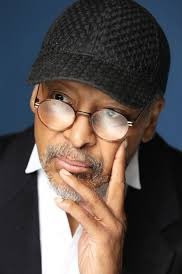 You might have come to know James Mtume as the jazz percussionist behind legendary artists such as Miles Davis, McCoy Tyner, Freddie Hubbard, Lonnie Liston Smith and Pharoah Sanders, or as the R&B artist behind the smash hit ‘Juicy Fruit’ that was later sampled by the hip-hop legend Notorious B.I.G. You could have also found Mtume through the music of Roberta Flack, Stephanie Mills, Mary J. Blige, and Phyllis Hyman, all artists who benefited from his writing genius with his collaborator Reggie Lucas. Then there was the Mtume who was behind the soundtrack of television’s “New York Undercover,” the popular hip-hop inspired series in the 1990s.
You might have come to know James Mtume as the jazz percussionist behind legendary artists such as Miles Davis, McCoy Tyner, Freddie Hubbard, Lonnie Liston Smith and Pharoah Sanders, or as the R&B artist behind the smash hit ‘Juicy Fruit’ that was later sampled by the hip-hop legend Notorious B.I.G. You could have also found Mtume through the music of Roberta Flack, Stephanie Mills, Mary J. Blige, and Phyllis Hyman, all artists who benefited from his writing genius with his collaborator Reggie Lucas. Then there was the Mtume who was behind the soundtrack of television’s “New York Undercover,” the popular hip-hop inspired series in the 1990s.
My first exposure to Mtume was as a college student at Morgan State University in the early 1980s when ‘Juicy Fruit’ was in constant rotation over the radio. I came to know James Mtume as a friend, on-air colleague, and family man, who left us too soon this week at age 76. To say Mtume was a renaissance man is an understatement. “Tooms,” as many of us knew him, was a deeply intellectual and introspective man. He was a musical savant but a social activist to his core. The son of famed saxophonist Jimmy Heath, Mtume’s destiny was music but his chosen path was Black liberation. Mtume found his political voice as a young man when he joined the US organization and that early experience shaped his global perspective.
If you lived in the New York City area, for decades you could tune into 98.7 WRKS-FM, or “KISS-FM” as it was popularly known, on Sunday mornings as Mtume was dropping knowledge as part of the ‘Open Line’ public affairs radio program. His analysis was always sharp and offered from a unique perspective, thus his being called “The Third Answer.” It is through that radio program that I really got to know James Mtume. I became a regular guest on the program and would frequently join Mtume, and co-hosts Bob Slade and Bob Pickett for what was always a lively discussion on politics and culture.
It was the off-air conversations that I enjoyed the most and will miss the most. I can still hear his voice on the other end of the phone, “Brother, this is Mtume. What are we going to do about…?” That would begin a 30 minute or more analysis of a given issue that would be carried over the course of several days, on-air and off-air. Mtume was a generous man. He was generous with his time and his space, always making room for the next generation. Mtume transcended generations. He challenged you to think beyond your comfort zone and was unafraid to delve into topics that might be deemed controversial.
I recall a ‘Stop the Violence’ event that the ‘Open Line’ program held at Essex County College in Newark, New Jersey. Those of us who were on-air personalities spoke to the crowd, but it was Mtume who brought the fire. He did not hold back his anger on the excessive gun violence in the Black community and spoke passionately about the need to stop ‘Black-to-Black violence.’ Mtume wanted to stress what we were doing to each other in the cycle of violence that was destroying families. The respect that the community held for him was evident by the silence in the auditorium when he spoke. I remember thinking that his participation was a true act of selflessness. He didn’t have to be there. He was a music icon; a successful artist and producer and he could have easily shown little concern for what was happening on the streets. That simply was not Mtume though. He loved his people too much to be a bystander, an observer of violence as Black lives were being destroyed. James Mtume was of the community and he viewed his success as an obligation to the Diaspora.
I feel fortunate to have become acquainted with James Mtume, the man. There was no stage that separated us, no veil of celebrity that served as a barrier to friendship. Our relationship was based upon a common love for our people and our common desire to see Black life uplifted around the world. His life speaks to the potential of celebrity and the expectation we should have of our most gifted artists. Yes, we could jam to an Mtume cut but he provided so much more than a beat. His intellect will be missed. His thoughtfulness will be missed. His embrace of blackness will be missed. He lived an unapologetically Black life.
Rest in peace Mtume. Until we meet again.
Walter Fields is the Executive Editor of NorthStarNews.com






















